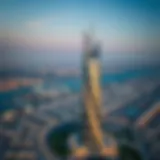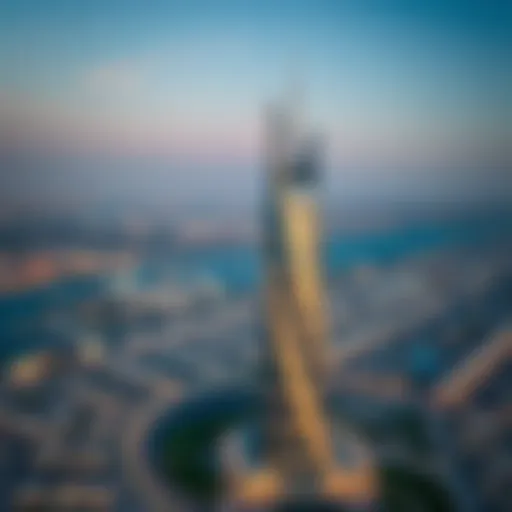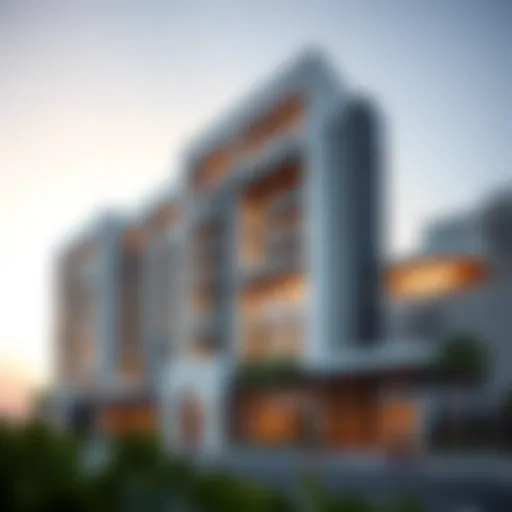Ramadan 2024 in the UAE: Dates and Cultural Insights
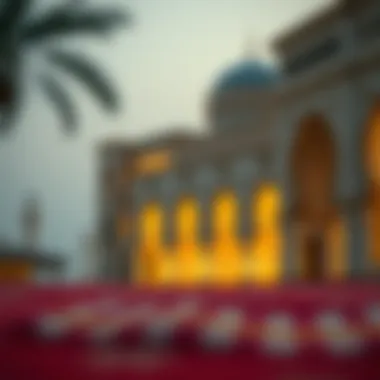

Intro
As the crescent moon signals the start of Ramadan, a unique tapestry of cultural and communal practices unfolds across the United Arab Emirates. Ramadan is not just a ritual; it's a period steeped in reflection, empathy, and communal spirit. In 2024, this sacred month will commence around the evening of Sunday, March 10, lasting until approximately April 9, depending on the moon sighting. The significance of this holy month transcends mere fasting; it shapes social interactions, alters public rhythms, and even impacts the business landscape, particularly in the bustling real estate market of Dubai.
During this time, residents and expatriates alike come together to observe traditions and partake in special prayers, fostering a sense of unity. Families gather for iftar—the evening meal that breaks the fast—often extending this hospitality to neighbors and friends, enhancing the community spirit that characterizes the UAE. Businesses adapt their operating hours, ensuring that there is sensitivity towards those fasting, often leading to vibrant markets and community gatherings in the evenings.
The impact of Ramadan also ripples through the real estate sector, stirring interest from investors and homebuyers alike. It's a period where many consider making significant investments, especially in Dubai, where the properties are often as appealing as the festivities. This article will delve deep into the key dates, practices, and economic implications of Ramadan 2024 in the UAE, providing a thorough guide for those navigating this fascinating month, particularly for those keen on the Dubai property market.
Overview of Ramadan
As we approach Ramadan 2024, it is vital to comprehend the depth and significance of this month. Ramadan is more than just a time of fasting; it encapsulates a cultural and spiritual essence that resonates through every corner of the United Arab Emirates. Understanding Ramadan allows us to appreciate the lifestyle adjustments and communal bonds that form. It also highlights the economic impact, especially in areas like the real estate market, making this knowledge invaluable for investors and homebuyers.
Significance of Ramadan in Islam
In Islam, Ramadan holds a profound spiritual significance. It is regarded as a month of reflection, devotion, and community. Muslims believe that fasting during Ramadan is an obligation—it teaches humility and empathy, as those fasting experience hunger and thirst. The act is meant to purify the soul and foster a deeper connection to God.
The core principle can be summarized simply: fasting is a means of reaching Taqwa, or God-consciousness. It is an opportunity for fresh starts and renewals—something many people seek, especially in busy urban environments like Dubai. Not only does Ramadan foster personal growth, but it also nurtures a sense of community as families come together, breaking their fasts at sunset. This month encapsulates the blend of personal spirituality and communal ties, making it significant for both individuals and society as a whole.
Global Observance Patterns
Around the world, the observance of Ramadan exhibits diverse characteristics shaped by local customs and cultures. Here are some patterns that stand out:
- Different Cultures: In Indonesia, the most populous Muslim country, Ramadan is celebrated with vibrant markets and communal prayers. In contrast, in Morocco, unique dishes like Harira soup are customary for Iftar, the meal breaking the fast.
- Economic Impact: Many businesses, particularly in predominantly Muslim countries, adjust to the rhythm of Ramadan by changing working hours and extending market hours during evenings.
- Community Gatherings: From sharing meals with neighbors to hosting charitable events, the social dynamic during Ramadan encourages collective participation in acts of faith and goodwill.
"Ramadan is not about just abstaining from food, but about feasting on community, compassion, and consciousness."
In the UAE, the nuances of Ramadan's observance offer both opportunities and considerations for expatriates and investors. Engaging in local customs can offer deeper insights into the rhythms of daily life during this sacred time and how these influence various sectors, especially real estate, as families seek homes that align with their values.
This overview serves as a gateway to understanding the deeper dimensions of Ramadan and its importance not only in cultural practices but also in shaping the society around us.
When is Ramadan ?
Understanding when Ramadan occurs in 2024 is significant for those living in the UAE, as it helps align personal schedules, business activities, and cultural engagements with the rhythms of this holy month. For expatriates, it offers an opportunity to immerse themselves in local customs, while investors can plan their real estate strategies around these pivotal dates. Given the UAE's status as a melting pot, the adjustments needed during Ramadan can influence various sectors, making the awareness of the timings essential for smooth operations.
Start Date in the UAE
In 2024, Ramadan is anticipated to begin on the evening of Sunday, March 10, with the first day of fasting occurring on Monday, March 11. However, exact dates can vary based on the sighting of the moon, which is a traditional practice in Islamic cultures. Hence, the announcement by local mosques on the sighting is pivotal. It’s essential for residents and visitors alike to stay updated through announcements or community postings.
End Date and Eid al-Fitr
Ramadan is expected to conclude on Tuesday, April 9, leading into the celebration of Eid al-Fitr. This festive holiday marks the end of fasting and is anticipated to commence on Wednesday, April 10. During Eid, communities throughout the UAE come alive with festivities, family gatherings, and communal prayers. The holiday is not just a conclusion to a month of devotion but also signifies gratitude and joy, often spent in the company of loved ones.
Eid al-Fitr is a time for generosity — sharing blessings and food with the less fortunate is an integral part of the celebration.
As these key dates approach, businesses, particularly in the hospitality and retail sectors, adjust their operations to cater to the influx of people seeking to celebrate, positioning themselves to capitalize on the spirit of the season. Investors monitoring the market trends often find opportune moments during this time, especially regarding real estate, as families seek larger homes or properties that can accommodate festive gatherings.
Observing Ramadan in the UAE
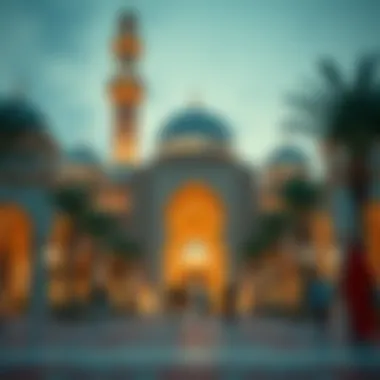

Observing Ramadan in the UAE is not just a practice of fasting; it embodies a rich tapestry of cultural heritage and community spirit among its residents. For investors, homebuyers, and real estate agents, understanding this dynamic offers crucial insights into the impact of Ramadan on the local market and society as a whole. It’s a time when spirituality and tradition intersect with daily life, highlighting the unique atmosphere that defines the Emirates during this holy month.
Traditional Practices
During Ramadan, traditional practices come to life, marking the observance in visually and culturally significant ways. One of the most cherished customs is Iftar, the evening meal that breaks the fast. Families and friends gather to enjoy dates, water, and a variety of dishes such as Harees and Kabsa. Restaurants across the UAE transform into vibrant hubs, offering special Iftar menus, which often feature a blend of international and local cuisine, reflecting the multicultural dimensions of the population.
Additionally, the call to prayer resonates throughout the city, signaling the time to begin and break the fast. An evident sense of community spirit emerges as people share meals and express gratitude. Many participate in Taraweeh, nightly prayers held in mosques, fostering a deeper spiritual connection.
- Key aspects of traditional practices include:
- The emphasis on family and community gatherings.
- Diverse culinary offerings in restaurants and at homes.
- The increased participation in nightly prayers.
These elements create a cohesive atmosphere that benefits various sectors, particularly the hospitality and food industries, during this prosperous month.
Cultural Variations Across the Emirates
In the United Arab Emirates, Ramadan is not merely observed uniformly but varies significantly across its seven emirates. In Dubai, for instance, the emphasis on international gatherings is prevalent, where residents from myriad backgrounds come together and partake in communal meals.
Conversely, in the more traditional emirates like Sharjah, customs draw more heavily on local practices, reflecting a strong adherence to traditional values. Local markets thrive as fasting individuals shop for food after sundown, showcasing the importance of regional flavors and customs in communal dining.
- Differences in cultural observations include:
- Dubai: A blend of modernity and tradition with lavish Iftar events.
- Abu Dhabi: Focus on cultural heritage and local cuisine.
- Ras Al Khaimah: Retaining more conservative practices.
These variations contribute to the richness of the UAE’s cultural landscape during Ramadan, providing a diverse experience for both expatriates and tourists. Being aware of these differences is essential for anyone looking to invest or participate in the local culture, as it underscores consumer behaviors and preferences.
"Understanding the local customs and traditions during Ramadan not only enhances community ties but also provides valuable insights for navigating the real estate market."
By diving deeper into these traditional practices and cultural variations, investors can better gauge the local dynamics, fostering a more informed approach to their endeavors during this pivotal month.
The Impact of Ramadan on Daily Life
Ramadan isn't just a month of fasting for the faithful; it reverberates throughout society, shaping daily routines and interactions in profound ways. In the UAE, where diverse cultures converge, this holy month presents a unique blend of traditions and modern secular practices. The adjustments made during Ramadan aren't merely inconveniences; they reflect a cultural ethos that prioritizes community, spirituality, and reflection.
Adjustments in Work Hours
One of the most notable impacts of Ramadan is the change in work hours. Many companies across the UAE adjust their schedules to accommodate fasting. Typically, the working hours are reduced to six, allowing employees time to rest and prepare for iftar, the evening meal that breaks the fast.
For instance, a regular 9-to-5 job could become an 11 AM to 5 PM shift. This not only helps in maintaining productivity but also respects the traditions associated with Ramadan. It's a common sight to see workplaces filled with the aroma of dessert preparations or employees rallying for a group iftar after work.
Key Elements of Adjusted Hours:
- Generally, corporate settings adopt a flexible approach to work hours.
- Government offices often operate shorter hours as well.
- Educational institutions sometimes have altered schedules, giving students breaks for prayer and iftar.
Understanding this adjustment is key for investors and expatriates who must adapt to a transformed work environment.
Social Gatherings and Iftar Celebrations


The social fabric of the UAE becomes rich with activity during Ramadan, particularly during iftar moments. Families and friends gather to share meals, creating a sense of community and belonging. Restaurants shift to offer special iftar menus that range from luxurious buffets to traditional dishes.
It’s not uncommon for people to receive invitations to iftar gatherings, even from acquaintances and colleagues. It fosters an environment of goodwill; many offer to share food with those less fortunate, embodying the spirit of charity that Ramadan emphasizes.
Features of Iftar Celebrations:
- Diverse Menus: Restaurants and houses serve a mix of Emirati and international dishes.
- Community Spirit: Iftar meals are often community-based, inviting people from various backgrounds to share in the experience.
- Cultural Interaction: Increased interactions between locals and expatriates during these gatherings enhance cultural understanding.
Real Estate Market Trends During Ramadan
Understanding the real estate market trends during Ramadan is essential for investors and homebuyers looking to navigate the property landscape in the UAE, particularly in Dubai. As the nation engages in this holy month, various factors influence buyer behavior and market dynamics, making it crucial to grasp these elements for informed decision-making. Ramadan's impact touches everything from property viewings to investment opportunities, and recognizing these nuances can lead to significant advantages.
Investment Opportunities
During Ramadan, there is often a notable shift in the real estate climate. Historically, demand for properties might wane slightly in the lead-up to the holy month, as many residents focus on spiritual observances and family gatherings. However, this window can present unique investment opportunities.
- Price Negotiations: Since many buyers might pull back during Ramadan, sellers may become more flexible on pricing. This can allow savvy investors to strike deals that are hard to come by during other times of the year.
- Focus on Family Living: Properties that cater to families often see increased interest as expatriates and locals prioritize residential properties away from the bustle of the city. This trend increases the demand for larger villas and townhouses with community facilities.
- Emerging Developments: Ramadan often shines a light on new projects being launched around this season. It’s not uncommon for developers to introduce promotional offers aimed at capturing the attention of potential buyers. This can culminate in favorable payment plans and discounts, especially for off-plan projects.
For instance, consider areas like Dubai Marina or Jumeirah, which experience elevated interest from families seeking larger living spaces during this festive period. Furthermore, these locales typically embed modern amenities that align well with the communal spirit of Ramadan, proving attractive to investors.
Market Responses to Religious Observances
The real estate market is sensitive to cultural practices, and Ramadan is no exception. Understanding the market's response to these religious observances is vital for anyone engaged in property transactions during this time.
- Reduced Transactions: Traditionally, there is a drop in real estate transactions during Ramadan, particularly in the first half of the month. The focus often shifts towards social gatherings and spiritual commitments, causing potential buyers to delay decisions. As such, it’s wise for agents and investors to set realistic timelines when planning showings and closings.
- Iftar and Community Events: Many real estate developments capitalize on the spirit of Ramadan by hosting Iftar dinners and community activities. This not only enhances community engagement but also allows developers to showcase their properties in an informal, welcoming setting that's conducive for discussions about purchases or rentals.
- Shift in Marketing Tactics: Real estate agents often tailor their marketing strategies during Ramadan. They tend to highlight family-oriented features and communal amenities, aligning messaging with the values of the season. This can include showcasing properties with spacious kitchens for preparing Iftar meals or outdoor areas for gatherings.
In sum, the real estate landscape during Ramadan presents both challenges and opportunities for stakeholders. By remaining attuned to shifting dynamics and culturally significant observances, investors and agents can maximize their strategies and adapt their approaches for success.
Understanding Ramadan’s influence on the real estate market gives investors an upper hand, allowing them to navigate opportunities that might be overlooked by others focused solely on conventional trends.
Ramadan and Cultural Sensitivity
During the holy month of Ramadan, cultural sensitivity is not just a nicety; it's a necessity, particularly in a diverse milieu like the UAE. The nation is home to a mosaic of cultures and religions, making it essential for both expatriates and locals to understand and respect the nuances of this significant period. By harmonizing practices and beliefs, the spirit of Ramadan is celebrated not only as a time of fasting and prayer, but as an opportunity for communal outreach and understanding. This sensitivity fosters goodwill, making the environment more welcoming for everyone involved.
Guidelines for Expatriates
For expatriates living in the UAE, understanding the customs and decorum associated with Ramadan is crucial. Here are some practical guidelines to ensure a respectful experience:
- Respect Fasting Hours: Non-Muslims are expected to refrain from eating, drinking, and smoking in public during fasting hours. It's a sign of respect towards those who partake in fasting.
- Dress Appropriately: Opt for modest clothing, particularly in public places. This not only shows respect for the local traditions but ensures a more pleasant time for all.
- Engage Mindfully: If invited to an Iftar, the breaking of the fast, attend with genuine interest. It’s an excellent opportunity to engage with local customs and deepen relationships.
- Be Cautious with Conversations: Discussions about religion or fasting should be approached with care. It’s best to listen and learn, rather than assume an outsider’s perspective is understood.
By following these guidelines, expatriates can navigate the sensitive waters of Ramadan with grace and respect, while also enriching their own cultural experiences.
Engagement with Local Communities
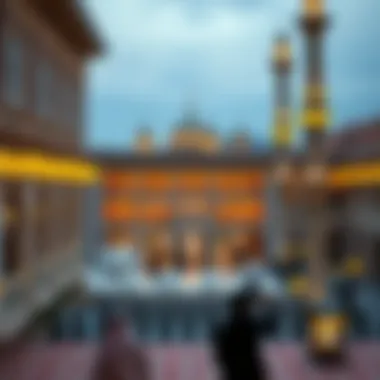

Building bridges between expatriates and local communities throughout Ramadan enhances mutual respect and understanding. Here are some ideas for engagement:
- Participate in Local Events: Many emirates host Iftar gatherings and community iftar meals. Joining these events can help foster friendships and deepen cultural understanding.
- Volunteer Time: Contributing a few hours to charitable organizations during Ramadan can help you connect with local residents and demonstrate your commitment to community welfare.
- Share Knowledge: If you're knowledgeable about your own traditions during holidays, share them! Inviting questions and discussions about different practices encourages a more inclusive atmosphere.
"The real beauty of Ramadan lies in its spirit of community, and when people take the time to understand and participate, the barriers that divide us can start to diminish."
Fostering relationships during this holy month can extend beyond personal experience. Positive engagement can lead to a broader cultural dialogue, resulting in a stronger, unified community that celebrates diversity in all its forms. The commitment to cultural sensitivity will not only enhance one’s Ramadan experience but also contribute to a more harmonious living environment.
The Role of Technology During Ramadan
As Ramadan approaches, the integration of technology into various aspects of life becomes increasingly relevant, particularly in the UAE where the season is marked by unique cultural expressions and communal activities. In this digital age, technology plays a pivotal role in enhancing the Ramadan experience. It offers convenience, connects communities, and improves accessibility, fostering an environment where spiritual reflection and community ties can flourish.
Apps and Digital Platforms
The mobile app market has seen a significant surge, especially during Ramadan. Many applications provide a range of tools tailored for this holy month. From prayer time notifications to Quran recitation apps, technology makes it easier for individuals to participate in religious practices. Here are some noteworthy features:
- Prayer Schedule: Numerous apps feature prayer time alerts that align with local timings, making sure that users don’t miss any important prayers.
- Quran Study: Applications that offer translations and commentaries provide an opportunity for deeper understanding of the holy text, facilitating learning.
- Iftar Timing Notifications: Several digital platforms also help in tracking Iftar timings, allowing users to break their fast with precision.
- Community Engagement: Social media apps have become vibrant platforms for sharing iftar meals and community events, promoting togetherness.
One popular example is the "Muslim Pro" app, which has become a staple for users in the UAE for its comprehensive tools and features. Users can share their experiences and connect with others through a dedicated community section.
Online Grocery Shopping Trends
As fasting hours extend, the habits of consumers change significantly during Ramadan. Online grocery platforms witness an uptick in users as people seek convenience without venturing outdoors.
- Increased Orders: Grocery apps like "Carrefour" and "Noon" see spikes in demand as families stock up for Iftar and Suhoor meals.
- Availability of Special Offers: Many retailers offer promotions on products often consumed during Ramadan, drawing even large crowds online.
- Meal Kits and Prepped Options: Some platforms are introducing meal kits tailored for Ramadan, designed to help users prepare traditional dishes with ease.
"The Ramadan surge in online shopping not only affords convenience but also allows families to focus more on spiritual practices rather than errands."
The effects of such technology trends extend beyond convenience; they reflect a shift in consumer habits where digital engagement paves the way for a more connected and assisted Ramadan. The integration of technology creates a smoother transition into the practices of this holy month, uplifting the community spirit and enhancing personal religious experiences.
For further insights on the technological innovations within the Islamic observance, refer to relevant discussions on platforms like Reddit and informative articles on Britannica which detail contemporary practices during Ramadan.
Reflections on Ramadan’s Importance
Ramadan holds a profound significance in the lives of millions. In the UAE, this month is particularly important for several reasons. It not only deepens spiritual connection and personal growth, but also fosters a unique sense of community among individuals from diverse backgrounds. This section will discuss how these factors play pivotal roles during Ramadan and emphasize the broader implications they hold in both local and global contexts.
Spiritual Growth and Community Ties
During Ramadan, individuals are encouraged to step back from the hustle and bustle of daily life. Fasting is a physical manifestation of restraint and discipline, inviting introspection into one’s actions and thoughts. Many people find that this time allows them to strengthen their connection to their faith.
- Reflection: Participants often engage in nightly prayers called Tarawih, creating spaces for communal worship. These gatherings instill feelings of camaraderie among worshipers, allowing them to share in the experience of devotion.
- Connection with the Less Fortunate: Ramadan also inspires acts of charity. The practice of Zakat—the obligation to give to the needy—takes on heightened importance during this month. Community initiatives, such as food drives or fundraisers, are quite common. They provide not only for those who are less fortunate, fostering empathy, but also deeply enhance community bonds.
In short, Ramadan serves as a platform where spirituality acquires practical relevance. Through individual actions, relationships among community members are strengthened and the social fabric becomes more intertwined.
Economic Considerations in a Global Context
The economic implications of Ramadan are vast, connecting diverse regions and markets worldwide. In the UAE, as the population swells with both locals and expatriates, the consumption patterns shift significantly.
- Increased Retail Activity: Many businesses strategically plan product launches or special promotions to cater to consumers during this period. The demand for dates, traditional sweets, and iftar meals skyrockets, bolstering sales and generating job opportunities. The restaurant sector often sees changes as well, with more establishments offering breaks for iftar.
- Global Impacts of Local Practices: These shifts are not contained within borders. Businesses across the world customize products to appeal specifically to Muslim consumers. For example, international brands may produce limited editions of products suitable for Ramadan.
- Tourism Boost: For the UAE, Ramadan also redefines tourism. Visitors are drawn not only by the spiritual experience but also the cultural events such as Ramadan markets, making this a lucrative period for the hospitality sector.
In a nutshell, Ramadan highlights the intersection of spirituality with economic factors. As the month unfolds, it emphasizes how cultural practices converge with commerce, reminding us that such observances ripple throughout a larger global landscape.
"Ramadan transcends personal devotion—it’s a shared experience that stitches communities together while also influencing wider economic ecosystems."






